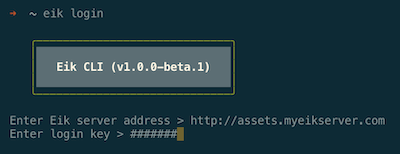@eik/cli reference
The Eik CLI lets you publish to Eik and manage import maps and aliases.
Install and run commands
To install the Eik CLI globally:
npm install --global @eik/cli
This makes the command eik available in your shell.
eik --help
To uninstall a globally installed Eik CLI:
npm uninstall --global @eik/cli
Eik command autocomplete in your shell
If you would like to be able to use tab key autocompletion for Eik commands, you can concatentate the following script to your .zshrc or .bashrc file.
###-begin-eik-completions-###
_eik_yargs_completions()
{
local reply
local si=$IFS
IFS=$'
' reply=($(COMP_CWORD="$((CURRENT-1))" COMP_LINE="$BUFFER" COMP_POINT="$CURSOR" eik --get-yargs-completions "${words[@]}"))
IFS=$si
_describe 'values' reply
}
compdef _eik_yargs_completions eik
###-end-eik-completions-###
Once done, you should be able to hit tab while typing Eik commands and get autocomplete suggestions.
As a devDependency
You can also add the Eik CLI as a devDependency.
npm install --save-dev @eik/cli
Now you can use npx eik to run commands with the version of the Eik CLI in your project.
npx eik --help
You can also add scripts to package.json and run them that way.
{
"scripts": {
"eik:publish": "eik publish"
}
}
npm run eik:publish
Using npx
You can run the Eik CLI from anywhere using npx.
npx @eik/cli --help
Available commands
Run eik with --help to see a description of all available commands and their aliases in your shell.
eik --help
You can also get help for each individual command the same way.
eik init --help
alias
Create or update an alias for a package, npm package, image or import map as identified by its name, version and type.
A package with the given name and version must already exist on the Eik server. The alias should be the semver major part of the package version. Eg. for a package of version 5.4.3, you should use 5 as the alias. The alias type (npm, map, package, image) is detected from eik.json in the current working directory.
eik alias <name> <version> <alias>
Replaces package-alias, map-alias and npm-alias from version 3.0.0 onward.
init
Creates a new default eik.json and saves it to the current working directory.
eik init
integrity
Retrieve file integrity information for package name and version defined in eik.json, then populate integrity.json file with this information for use in subresource integrity.
eik integrity [name] [version]
login
Write operations require you to be logged in to the Eik server. To log in, run the login command.
eik login
The login command will ask for a server URL and a server key.
Server keys are configured on the server and, once entered,
the client will authenticate with the server and receive back
a JSON web token which it will save in an .eikrc file in the
users home directory for use in subsequent commands.

Log in without the command prompt
It is possible to bypass login prompts by providing the server URL and key via command line flags.
eik login --server https://eik.store.com --key YOUR_EIK_KEY
Log in with multiple Eik servers
It is possible to be authenticated against several Eik servers at once by calling the eik login command multiple times and providing different server URLs and keys each time.
eik login --server https://eik1.store.com --key YOUR_EIK_KEY
eik login --server https://eik2.store.com --key YOUR_EIK_KEY
Once logged in
So long as the client is logged in to a single server, all subsequent commands will know which server to use and provide credentials automatically.
eik publish
N.B. If the client is authenticated with more than one server, it may be necessary to tell the client which server to use when using commands since the client will not decide which authenticated server to give precedence to. The --server (or -s for short) flag can be used to do this.
eik publish --server https://eik.store.com
map-alias
This command is deprecated, use eik alias
See alias
meta
Retrieve meta information by package, map or npm name.
If a given name exists in several types (package and map for example), results will be returned and displayed from all matching types.
eik meta <name>
npm-alias
This command is deprecated, use eik alias
See alias
package-alias
This command is deprecated, use eik alias
See alias
ping
Ping an Eik server to check that it is responding.
eik ping [server]
publish
Publish a package to an Eik server. Reads configuration from eik.json or package.json.
eik publish
version
Compares local files with files on server and increments the "version" field in eik.json if necessary.
eik version [level]
Programatic usage
If you need to script commands from the Eik CLI, consider importing @eik/cli in JavaScript.
The programatic API is mostly the same as the CLI, although the CLI has some extra named commands that use the same programatic API behind the scenes.
import cli from "@eik/cli";
Your editor should be able to show code suggestions and inline documentation for the API.
alias
Create or update an alias for a package on the Eik server.
const result = await cli.alias({
server,
name,
version,
alias,
token,
type,
});
integrity
Get integrity information of a published asset.
const result = await cli.integrity({
server,
name,
version,
});
login
Log in using a key to get the token needed by other commands.
const result = await cli.integrity({
server,
key,
});
map
Publish a map to the Eik server.
const result = await cli.map({
server,
name,
version,
file,
token,
});
meta
Get metadata about a published asset.
const result = await cli.meta({
server,
name,
version,
});
ping
Ping the Eik server.
const result = await cli.ping({
server,
});
publish
Publish a package to the Eik server.
const result = await cli.publish({
server,
name,
version,
file,
token,
type,
});
version
Similar to npm version, but updates eik.json.
const result = await cli.version({
server,
name,
version,
files,
type,
});